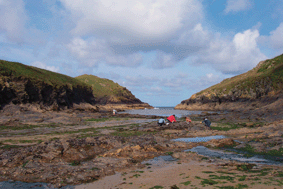Metabolomics is increasingly being used to characterise the interactions of organisms with their natural environment. This article describes the latest developments in this vibrant field. The first section highlights environmental studies that are exploiting recent technological advances in metabolomics, including developments in NMR spectroscopy and mass spectrometry, with a particular focus on toxicity testing in ecological risk assessment. Subsequently, recent laboratory studies of organism function and metabolic responses to stress are reviewed, including investigations of cold, heat and anoxic stress. The importance of model organisms and systems biology within environmental metabolomics is then highlighted. Finally, the first applications of metabolomics to actual field investigations are discussed, with a particular focus on environmental monitoring. During the past year, environmental metabolomics research has been conducted on more than 20 model and non-model species, including eight freshwater and marine fish, nine species of aquatic and terrestrial invertebrates, as well as plants and microbes, demonstrating the rapid growth of this field.

You have access to this article
 Please wait while we load your content...
Something went wrong. Try again?
Please wait while we load your content...
Something went wrong. Try again?


 Please wait while we load your content...
Please wait while we load your content...